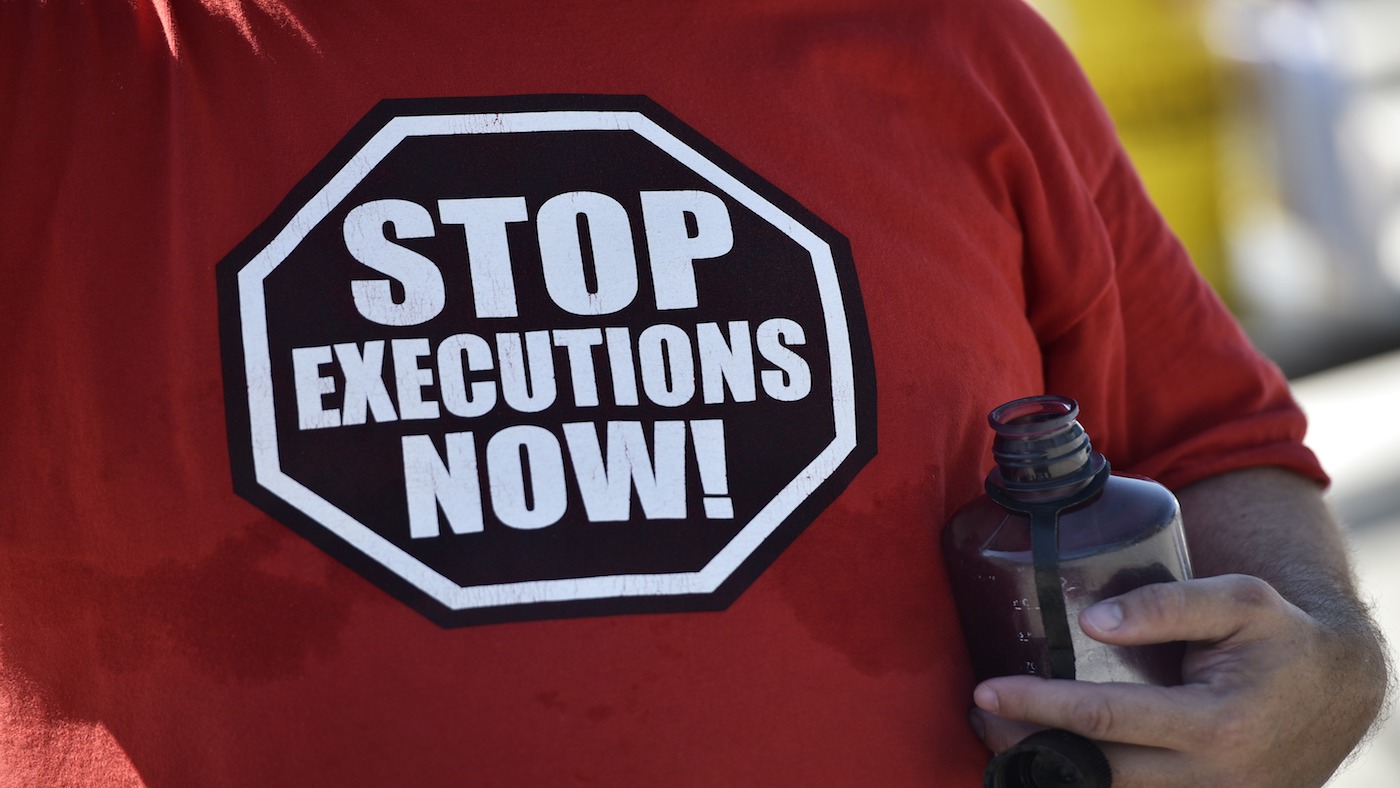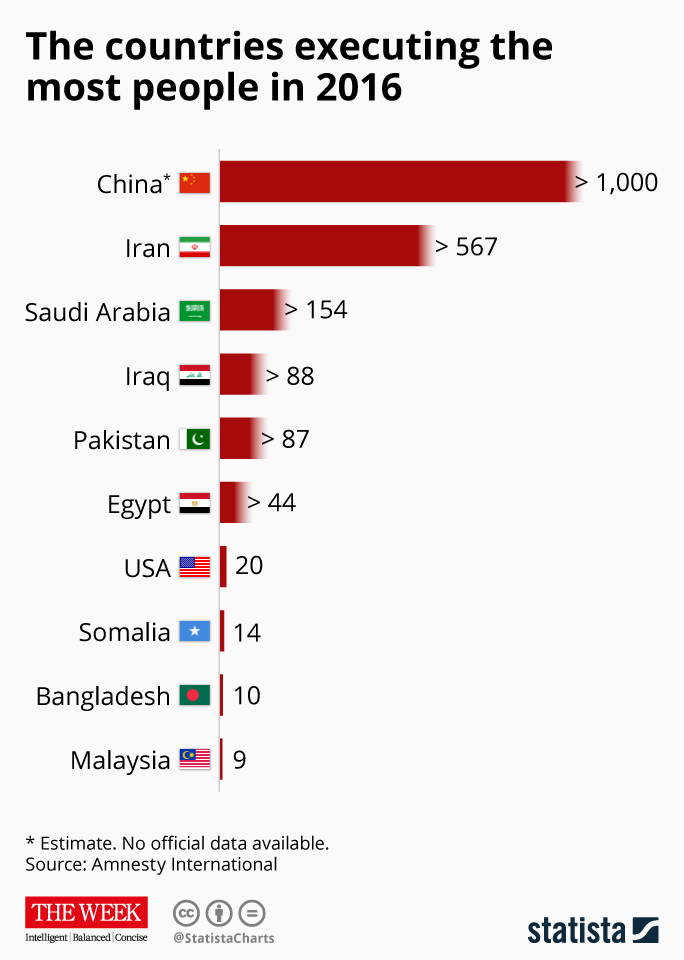The death penalty: Who are the world's biggest executioners?
Amnesty International report reveals number of executions fell in 2016 - but China is keeping its figures secret

A free daily email with the biggest news stories of the day – and the best features from TheWeek.com
You are now subscribed
Your newsletter sign-up was successful
The number of executions across the world fell by more than a third in 2016, according to a new report from Amnesty International.
At least 1,032 people were executed in 23 countries last year, down from 1,634 in 2015.
However, Amnesty says the number of death sentences imposed - 3,117 - is a significant increase on the previous year and exceeds the previous highest total recorded in 2014.
The Week
Escape your echo chamber. Get the facts behind the news, plus analysis from multiple perspectives.

Sign up for The Week's Free Newsletters
From our morning news briefing to a weekly Good News Newsletter, get the best of The Week delivered directly to your inbox.
From our morning news briefing to a weekly Good News Newsletter, get the best of The Week delivered directly to your inbox.
There is one country which was not included in the data but which is believed to have carried out more executions that the rest of the world: China.
Beijing carries out several thousand executions each year, but the figures are classified as state secrets.
Which countries still have the death penalty?
Some 57 countries retain the death penalty, while 141 countries, or more than two-thirds, have abolished it, either in law or in practice.
A free daily email with the biggest news stories of the day – and the best features from TheWeek.com
Benin and Nauru both abolished the death penalty for all crimes last year, while Chad and Guatemala took significant steps towards abolition.
By contrast, after more than 60 years without any executions, Maldives last year took steps towards reintroducing the death penalty.
However, Amnesty reports, despite regressive moves in some grounds, the global trend remains towards abolishing the death penalty.

Who are the world's main executioners?
China does not release information about the death penalty, but Amnesty calls it "the world's top executioner" and believes it carries out judicial killings "in the thousands" every year. Beijing is thought to execute more people than the rest of the world combined.
There are 46 offences still punishable by death in China, continues Amnesty, and the authorities continue to use the death penalty to send political messages.
The charity adds that it is impossible to verify claims that recent years have seen a decrease in executions following a review of death penalty cases.
Iran carried out at least 567 executions in 2016, more than half of Amnesty's attested total worldwide, although only 242 were announced through official or semi-official sources. At least 328 people were killed were for drug-related offences, says Amnesty.
Saudi Arabia executed 154 people, while executions in Iraq and Pakistan were set at 88 and 87 respectively.
What about the US?
The United States dropped out of the top five biggest executioners for the first time since 2006, with its figure of 20 people the lowest number recorded since 1991. Amnesty says the rate is half that of 2007 and a third that of 1997.
The states of Georgia and Texas were responsible for 80 per cent of all US executions in 2016. The number carried out in Georgia - nine - almost doubled compared to 2015, while in Texas, the figure dropped from 13 to seven.
There were still 2,832 people on death row at the end of 2016, although the number of death sentences decreased from 52 in 2015 to 32 in 2016 - its lowest since 1973.
What execution methods are used?
Hanging is carried out in 14 countries and is the most common method of execution. Shooting is used in eight countries. China, the United States and Vietnam all execute prisoners via lethal injection.
Amnesty identifies Saudi Arabia as the only country to use beheading as a method of execution.
-
 Political cartoons for February 19
Political cartoons for February 19Cartoons Thursday’s political cartoons include a suspicious package, a piece of the cake, and more
-
 The Gallivant: style and charm steps from Camber Sands
The Gallivant: style and charm steps from Camber SandsThe Week Recommends Nestled behind the dunes, this luxury hotel is a great place to hunker down and get cosy
-
 The President’s Cake: ‘sweet tragedy’ about a little girl on a baking mission in Iraq
The President’s Cake: ‘sweet tragedy’ about a little girl on a baking mission in IraqThe Week Recommends Charming debut from Hasan Hadi is filled with ‘vivid characters’
-
 Epstein files topple law CEO, roil UK government
Epstein files topple law CEO, roil UK governmentSpeed Read Peter Mandelson, Britain’s former ambassador to the US, is caught up in the scandal
-
 Iran and US prepare to meet after skirmishes
Iran and US prepare to meet after skirmishesSpeed Read The incident comes amid heightened tensions in the Middle East
-
 Israel retrieves final hostage’s body from Gaza
Israel retrieves final hostage’s body from GazaSpeed Read The 24-year-old police officer was killed during the initial Hamas attack
-
 China’s Xi targets top general in growing purge
China’s Xi targets top general in growing purgeSpeed Read Zhang Youxia is being investigated over ‘grave violations’ of the law
-
 Panama and Canada are negotiating over a crucial copper mine
Panama and Canada are negotiating over a crucial copper mineIn the Spotlight Panama is set to make a final decision on the mine this summer
-
 Why Greenland’s natural resources are nearly impossible to mine
Why Greenland’s natural resources are nearly impossible to mineThe Explainer The country’s natural landscape makes the task extremely difficult
-
 Iran cuts internet as protests escalate
Iran cuts internet as protests escalateSpeed Reada Government buildings across the country have been set on fire
-
 US nabs ‘shadow’ tanker claimed by Russia
US nabs ‘shadow’ tanker claimed by RussiaSpeed Read The ship was one of two vessels seized by the US military